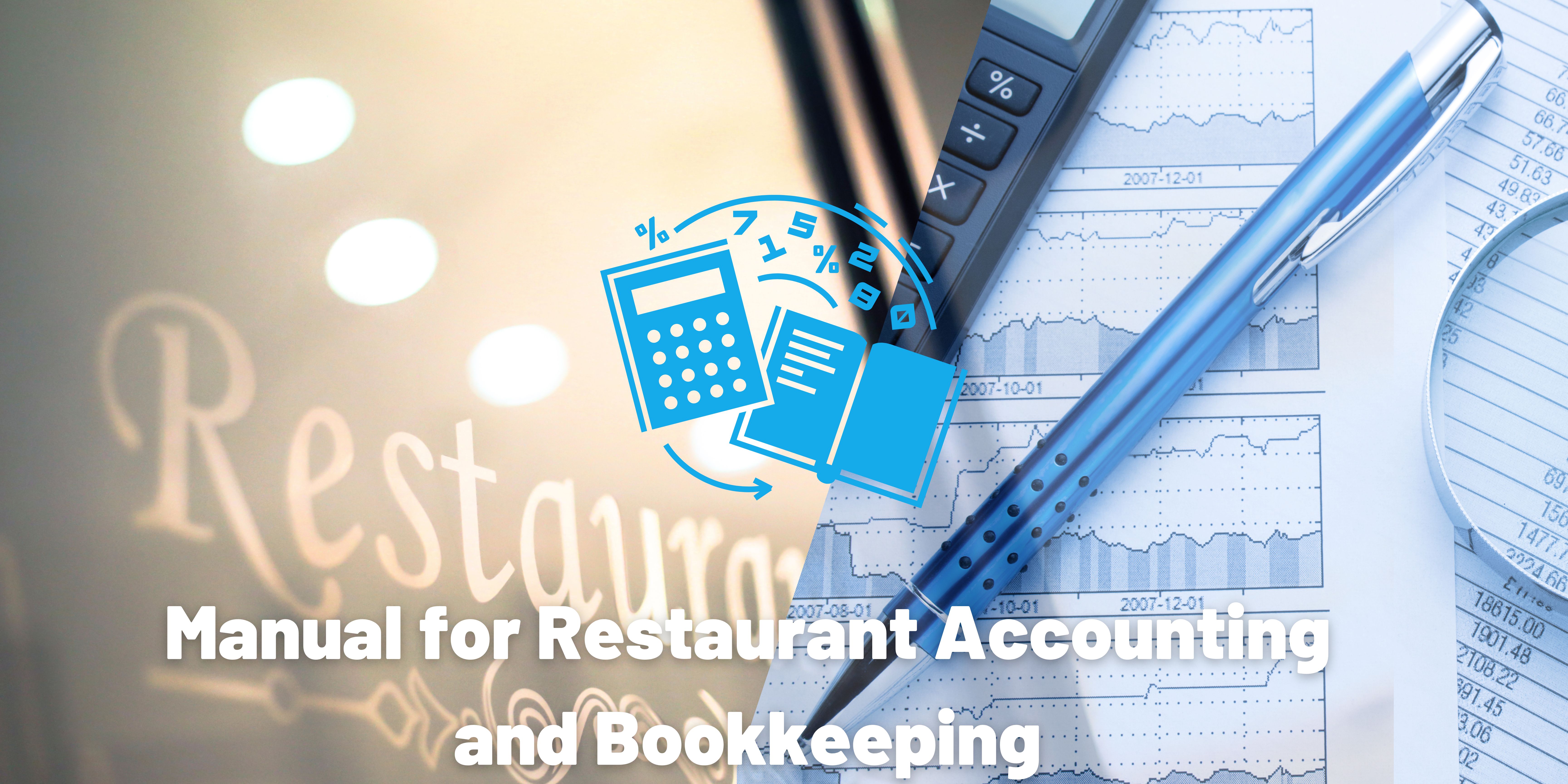Your Step-by-Step Manual for Restaurant Accounting and Bookkeeping
People with strong culinary talents and a love of hospitality frequently consider starting a restaurant. Accounting must be organized correctly if it is to be profitable as well as enjoyable. Understanding all the nuances of restaurant bookkeeping can help the business prosper and last for many years. Let’s discuss some challenges with bookkeeping in the restaurant industry.
Several Important Things About Restaurant Accounting:
An accounting report entails monitoring the restaurant’s financial operations and adjusting the budget to guarantee the proper launch and growth of the enterprise. Having a strong business strategy, an open structure, accurate records, etc. will all affect how successful your company is.
The major elements of restaurant accounting are:
- knowing where the money is spent.
- cost management.
- determining the main sources of revenue.
- figuring out the break-even point.
- checking financial records.
- creating a budget, tax returns, and other financial documents.
The establishment owner may spend more time operating the restaurant by working with a skilled accountant. A professional will meticulously record all financial data and maintain accounts payable notations, lowering the possibility of errors. You may estimate your future revenue level and identify what expenses weigh heavily on your budget by keeping detailed accounts.
Do you need to work with an accountant?
To succeed, entrepreneurs must be aware of their strengths and assign their flaws to experts. Personalizing the restaurant bookkeeping is akin to employing an engineer to prepare delectable; this is not the finest course of action.
The proprietor of the restaurant often manages the goods, hires the employees, and keeps an eye on the prices. You may avoid performing financial analysis and dealing with other common financial matters by working with an accountant.
Finding a specialist who is familiar with the nuances of preparing numerous foods and beverages from the menu, doing business, and comprehending front-of-house operations is essential. Depending on the chosen company model, a professional accountant may explain how to balance financial performance and what KPIs to focus on.
No More Stress from Bookkeeping:
Maintaining accurate financial records requires a lot of work, and even little errors may be expensive. We ensure that your figures are entirely correct so you can concentrate on expanding your business.
How can you locate an accounting professional for your company?
Restaurant accountants are skilled in correctly gathering the required data. The expert will examine financial results to spot patterns, needless spending, and operational issues. The work of an accountant might be outsourced, or they can be hired on a full- or part-time basis. Important things to bear in mind are:
- The hourly charge that accountants frequently demand varies depending on the length of the engagement. When dealing with an outsourcing firm, you may cut expenses by giving younger staff the grunt job and CPA specialists the extensive analysis.
- Select a CPA who is knowledgeable with the peculiarities of restaurant bookkeeping. A restaurant must utilize specific restaurant accounting techniques and standards since its business structure differs from that of other firms.
- Entrepreneurs frequently consider if they require a CPA or an accountant. These people work in fields that are quite similar. The distinction is that whereas accountants deal with regular concerns like payroll, debt management, journal entries, etc., CPAs do in-depth financial analysis and provide tax and fee advice.
Financial records:
Understanding the condition of affairs in restaurant bookkeeping requires reports. We suggest daily examination of sales figures and examination of table turnover. You must review the balance sheets, reports, revenues, and losses once every month. The following list of vital restaurant accounting records has been produced by us:
- The cafe’s whole revenue and outlays for a specific period are shown on the profit and loss statement. The amount of detail in a report like this determines how valuable it is.
- The day’s final sales report gives detailed information on the products consumers purchased by product group.
- To acquire a thorough view of a restaurant’s financial status, a business can record all financial transactions by category using a chart of accounts.
- The most crucial statement for every organization is the cash flow statement. It displays the capital used and the financial sources.
- The balance sheet is an accounting document for restaurants that lists the entire assets, liabilities, and capital of the business. A balance analysis enables you to determine the value of your restaurant. Most signs for financial analysis may be gleaned from the balance sheet.
- You may learn what the firm spends its money on and how it affects its earnings by reading the report on managed expenses.
The restaurant industry has a poor rate of return, therefore without financial statements, you would be operating it haphazardly. The secret to success and the best outcomes is routinely reviewing your restaurant’s bookkeeping and operating reports. You can maintain resources in any circumstance if you are familiar with the reporting, particularly the revenue and capital flow accounts.
Hints for Improved Restaurant Bookkeeping
Accounting relies heavily on experience; as a result, learning how to properly handle ledgers and accounts is not something that can be done overnight. To learn more about restaurant bookkeeping, see our advice on managing a restaurant. Your café will be able to achieve the success you had imagined if you regularly analyze financial activity:
Consult with your coworkers:
You will be able to manage your books more effectively if you are aware of how other restaurant operators maintain their records. It will be simpler to decide if it is best to engage a professional or maintain your restaurant’s accounting in-house after speaking with a successful owner.
Keep your accuracy:
The precise amount of revenue and spending should be shown in the paperwork. The results of a month or year can be significantly misstated by even a little daily rounding error of a few cents.
Recognize expenses:
Variable costs and fixed costs are the two types of expenses. The majority of the costs are in the first category, which also includes employee wages, taxes, and ingredients. Customers’ numbers and food production quantities do not affect fixed expenses, which include rent, equipment prices, insurance, etc. Understanding pricing for each category is essential when putting up reports.
Organize your revenue:
For restaurant bookkeeping, understanding the fundamentals of income is just as important as paying close attention to spending. Accounting records must include revenue from the sale of food items and from restaurant operations. Inaccurate income projection creates the false appearance that the company is losing money, which is not the reality. Revaluation of revenue is risky because the costs are too high.
Utilize specialized software:
Reliable software streamlines data entry, personal account creation, income control, report generation, and capital flow monitoring. Modern restaurant accounting software enables access to data from any device and has a simple interface in addition to offering a wide range of functionalities.
Point-of-sale (POS):
No matter the size of your company, you require a point-of-sale (POS) system to handle money, issue receipts, and keep track of inventory. It can be synced with accounting software.
Outsourcing your payroll:
Consider outsourcing your payroll even if you run your finance system yourself. It is responsible task; any error in the payment documentation might result in excessive costs. All changes in employment are tracked by a qualified accountant.
What procedures must you keep an eye on?
The crucial accounting procedures that keep the restaurant business functioning are included in restaurant bookkeeping. Even while it makes sense to hand off the majority of financial management to accountants, there are a few things a business owner has to be aware of to fully comprehend what they are discussing.
- Payroll is a pain, especially when dealing with erratic schedules and figuring out various pay scales.
- On-time payments to vendors ensure the restaurant’s continuous operation. To stay on top of your payment schedule, you may upload invoices to your accounting software.
- Based on the size of your business, experts advise employing the inventory management tool.
- Inventory aids in preventing the buildup of surplus goods in warehouses.
- Control your cash flow by keeping tabs on how much money comes in and out of your company.
- Consider your product sales revenue. Divide your revenue ideally among several product categories.
Regularly reconcile accounts to make sure all transactions are recorded and the appropriate funds are present. Payroll commitments, vendor debt, and loans all need to be reconciled. It is the only way to guarantee that every transaction is recorded. Information concerning issues with deposits, cash discrepancies, missing checks, and other errors is provided through account reconciliation.
Conclusion:
Making restaurant bookkeeping is difficult, and you can’t accomplish it without being familiar with the necessary procedures. With the use of accounting report tools, careful management of revenue, costs, and stocks enables you to manage your books. When the owner is familiar with the fundamentals, he can make crucial decisions that will help the business expand and increase revenues. To meet the demands of its customers, we offer specialized services. We are prepared to assist if you require a bookkeeper with comprehensive knowledge of the food industry. A smooth tax payment and proper documentation are ensured by competent restaurant bookkeeping.
Feel free to explore our custom accounting, bookkeeping and business services for the the restaurant and hospitality industry. read


